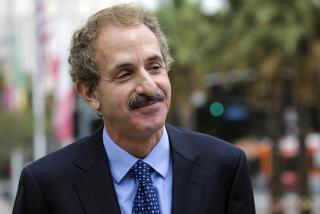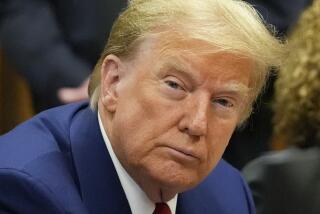Dispute Over First Lady’s Notes Going to High Court
- Share via
WASHINGTON — Setting the stage for a constitutional showdown, the White House served notice Friday that it will go to the Supreme Court to prevent Whitewater prosecutors from obtaining the notes of private conversations between First Lady Hillary Rodham Clinton and lawyers about elements of the investigation.
The White House said that it will ask the Supreme Court to overturn a new appellate court ruling that would force release of the notes. The issue is critical in the Whitewater controversy. Prosecutors are weighing whether to pursue obstruction of justice charges in the case.
They want to examine such documents for clues, among other things, to the unexplained reappearance last year of some of Mrs. Clinton’s 1980s law firm billing records, long sought under subpoena in the investigation. They are also looking for evidence of a possible effort to arrange the silence of a Whitewater investigation witness, former Justice Department official Webster L. Hubbell. Access to the notes--and their contents--could affect how the investigation of Mrs. Clinton proceeds.
As the White House served notice of its appeal plans, it also separately released information showing that Hubbell had visited the White House as many as 14 times after his resignation from the Justice Department. Hubbell’s visits in 1994 came while he was under an investigation that focused on his conduct while he was a law partner of Mrs. Clinton.
The Whitewater independent counsel and congressional committees are focusing on contacts with Hubbell for signs of improper inducements by friends or supporters of the Clintons.
In its 2-1 ruling unsealed Friday, the U.S. 8th Circuit Court of Appeals in St. Louis rejected Mrs. Clinton’s claim that her notes were protected by attorney-client privilege and need not be surrendered to prosecutors. The ruling reversed a lower-court decision that had supported Mrs. Clinton.
One set of notes the Clintons are withholding relates to a conversation among Mrs. Clinton, the Clintons’ personal lawyer, David Kendall, and two White House lawyers, Jane Sherburne and Miriam Nemetz, on July 11, 1995.
A second set of notes relates to Mrs. Clinton’s activities immediately after the July 1993 death of Deputy White House Counsel Vincent Foster. Among other things, independent counsel Kenneth W. Starr is examining whether there was an effort to conceal Whitewater-related records that had been in Foster’s possession. His death has been ruled a suicide.
The appellate judges said that Mrs. Clinton should not have expected confidentiality because White House lawyers were present in addition to her private attorney. In this view, White House lawyers work for the government, not an individual.
White House Counsel Charles F.C. Ruff said that the administration hopes the Supreme Court will decide by June whether to review the case. “We are disappointed in the ruling,” Ruff said. “We believe attorney-client privilege is a privilege that applies not only to the president and White House counsel but to all government lawyers and employees, and it’s always been treated that way.”
Ruff said that the White House position is not aimed at hiding Mrs. Clinton’s conduct from prosecutors because she has always denied wrongdoing. But it is about preserving “this president’s and future presidents’ ability to seek candid and confidential legal advice.”
Starr said in a statement that he was “very pleased” with the court decision, which he said rejects attempts by the White House “to withhold relevant information from the federal grand jury.”
Starr did not say what he expects the notes might reveal. But one set involved Mrs. Clinton’s private conversations during breaks in her appearance last year before grand jurors looking into her long-missing billing records as a private lawyer.
*
The records, which were copies of original documents, turned up in the White House residence nearly two years after they had been subpoenaed. Mrs. Clinton, as well as the president, disavowed any knowledge of where they had been. The documents related to work she had performed as a Little Rock, Ark., lawyer for a failed savings and loan that is at the heart of the Whitewater case.
In the Foster matter, Starr chiefly is looking into possible obstruction of justice in the White House’s removal of files from his office after his suicide. Mrs. Clinton, a close friend of Foster’s, has denied ordering the seizure of his files.
Starr in recent weeks has issued subpoenas and called a number of witnesses before a grand jury in Little Rock as his office has examined various employment engagements obtained by Hubbell between the time of his announced resignation on March 14, 1994, and his plea of guilty, on Dec. 6, 1994, to charges of fraud and income tax evasion.
Meanwhile, the information disclosed Friday regarding Hubbell’s 14 scheduled visits to the White House show that there was far more contact between him and the Clintons than previously known. In recent weeks, the White House had acknowledged that Clinton hosted Hubbell at the Camp David, Md., retreat over the July 4, 1994, weekend and that Mrs. Clinton called Hubbell at Thanksgiving in 1994 to urge him to fight the charges that loomed against him.
But according to the information released Friday, Hubbell also came to the White House on July 20, 1994, on the one-year anniversary of Foster’s suicide.
“On July 20th, the first lady recalls that she and Mr. Hubbell spoke of Mr. Foster. Mr. Hubbell also indicated at the time that he had done nothing wrong regarding his billings at the law firm,” said Lanny J. Davis, White House special counsel.
The White House has asserted that the Clintons and other officials did not sever ties with Hubbell because they did not realize at the time that he had become the focus of a criminal investigation and believed that his troubles involved only a private dispute with his former law partners.
On March 18, 1994, four days after he announced that he would resign, Hubbell was invited for dinner and to view a movie, along with about 60 other guests. Hubbell made four other visits that year at which he and other guests were in the company of the president or Mrs. Clinton.
The information provided Friday also shows that Hubbell was scheduled to meet on July 19, 1994, at the White House with Mickey Kantor, then Clinton’s chief trade representative. Kantor has acknowledged that he sought to help Hubbell and his family in 1994, including soliciting contributions to a trust fund established for Hubbell’s children.
Hubbell’s guilty plea related to his having bilked former clients and partners of the Rose Law Firm in Little Rock. It was also at Rose that Hubbell and Mrs. Clinton performed legal work that involved the now-failed Madison Guaranty Savings & Loan, whose collapse has cost taxpayers more than $50 million.
More to Read
Get the L.A. Times Politics newsletter
Deeply reported insights into legislation, politics and policy from Sacramento, Washington and beyond. In your inbox twice per week.
You may occasionally receive promotional content from the Los Angeles Times.











